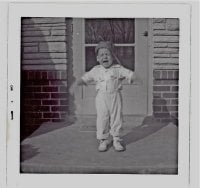 A young Christian guy wrote to ask, “Do I really have to care all that much about the Old Testament?”
A young Christian guy wrote to ask, “Do I really have to care all that much about the Old Testament?”
My answer:
If you want to care about something Jesus himself was deeply passionate about, then, yes, you need to care about the Old Testament.
The reason Jesus cared so much about the Old Testament–to which he often referred, and from which so many of his teachings were explicitly derived–is the same reason any person cares so much about his or her personal history. The Old Testament is the story of God before he incarnated himself as Jesus; it is the story of Jesus’ past. The Old Testament is the ground from which Jesus arose; his genealogical, social, cultural, and theological roots are embedded deeply within it.
The Old Testament is largely–in some ways you could even say mainly–about the future coming of the Jewish messiah. Jesus’ extraordinary claim–the miracle of his very life–is that he was the messiah everywhere foretold in the Old Testament. He understood himself to be that figure. He knew that he was the fulfillment of the prophecies foretold for centuries by the Jewish fathers and prophets.
As far as Jesus was concerned, the Old Testament was the story of which he personally was the climax.
So every Christian should care deeply about the Old Testament, in the same way that a person is naturally motivated to know everything they can about the past of someone for whom they have a great deal of love. If you found a box containing a wealth of information about the background of your father–letters he’d written; stories, poems and songs others had written about him; photographs of places he’d been and people he’d known; works of art he’d created–wouldn’t you dive right into those archives, and not stop until you’d read and studied every last bit of it?
If you love Jesus, then you should be attracted to the Old Testament just like you would be to that box containing your father’s history. In the most real of senses, the Old Testament is a book about your father’s history.
As an example of the degree to which the New Testament constantly reaches back to the Old Testament, here are some passages from the opening chapters of New Testament’s Gospel According to Matthew. Note how inextricable the life of Jesus is from the God of the Old Testament.
Matthew 1:20-24
An angel of the Lord appeared to him in a dream and said, “Joseph son of David, do not be afraid to take Mary home as your wife, because what is conceived in her is from the Holy Spirit. She will give birth to a son, and you are to give him the name Jesus, because he will save his people from their sins.” All this took place to fulfill what the Lord had said through the prophet [being the Old Testament prophet Isaiah, in Isaiah 7:14]: “The virgin will be with child and will give birth to a son, and they will call him Immanuel”—which means, “God with us.”
Matthew 2:2-6
When [King Herod] had called together all the people’s chief priests and teachers of the law, he asked them where the Christ was to be born. “In Bethlehem in Judea,” they replied, “for this is what the prophet [being Micah, at Micah:5-2] has written:
“ ‘But you, Bethlehem, in the land of Judah,
are by no means least among the rulers of Judah;
for out of you will come a ruler
who will be the shepherd of my people Israel.’”
Matthew 2:13-18
When they had gone, an angel of the Lord appeared to Joseph in a dream. “Get up,” he said, “take the child and his mother and escape to Egypt. Stay there until I tell you, for Herod is going to search for the child to kill him.” So he got up, took the child and his mother during the night and left for Egypt, where he stayed until the death of Herod. And so was fulfilled what the Lord had said through the prophet [being Hosea, at Hosea 11:1]: “Out of Egypt I called my son.”
When Herod realized that he had been outwitted by the Magi, he was furious, and he gave orders to kill all the boys in Bethlehem and its vicinity who were two years old and under, in accordance with the time he had learned from the Magi. Then what was said through the prophet Jeremiah was fulfilled:
“A voice is heard in Ramah,
weeping and great mourning,
Rachel weeping for her children
and refusing to be comforted,
because they are no more.”
And finally…
Matthew 2:19-23
After Herod died, an angel of the Lord appeared in a dream to Joseph in Egypt and said, “Get up, take the child and his mother and go to the land of Israel, for those who were trying to take the child’s life are dead.” So he got up, took the child and his mother and went to the land of Israel. But when he heard that Archelaus was reigning in Judea in place of his father Herod, he was afraid to go there. Having been warned in a dream, he withdrew to the district of Galilee, and he went and lived in a town called Nazareth. So was fulfilled what was said through the prophets: “He will be called a Nazarene.”
These passages, from the first part of the first book of the New Testament, are about as amazing as amazing gets, insofar as they illustrate what makes the Bible such a miraculous creation: though it is sixty-six different books written by forty or more people over some fifteen centuries, it is demonstrably one book, driven by one purpose, toward one goal, by one spirit. These passage are recognized by Christians as ringing affirmations that Jesus is the fulfillment of prophecies foretold about him by the Old Testament’s Isaiah, Micah, Hosea and Jeremiah. And that’s just a taste of the astounding kinds of revelations about Christ that one can glean from the Old Testament when one is familiar with the New.
So, again: yes, you should be interested in the Old Testament.
Yes, yes, yes, yes, yes.
***************************************************************************************************************













